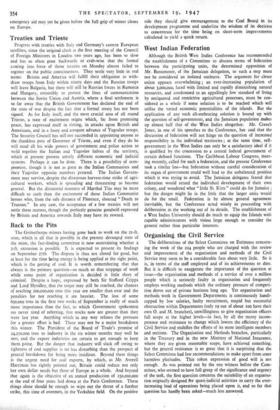Treaties and Trieste
Progress with treaties with Italy and Germany's eastern European satellites, since the original clash at the first meeting of the Council of Foreign Ministers in London two years ago, has been so slow and has so often gone backwards or crab-wise that the formal coming into force of those treaties on Monday almost failed to register on the public consciousness. They settle very little in real terms. Britain and America will fulfill their obligation to with- draw troops from Italy within ninety days and the Russian troops will leave Bulgaria, but there will still be Russian forces in Rumania and Hungary, ostensibly to protect the lines of communication between the Soviet Union and Austria, where a final settlement is so far away that the British Government has declared the end of the state of war despite the fact that a formal treaty has not been signed. As for Italy itself, and the most crucial area of all round Trieste, a state of excitement reigns which, far from promising peace, has expressed itself in rioting, in attacks upon British and Americans, and in a hasty and arrogant advance of Yugoslav troops. The Security Council has still not succeeded in appointing anyone to the thankless post of Governor of Trieste, and even if they do he will need all his wide powers of government and police action to weld together the Italian and Yugoslav halves of the territory, which at present possess utterly different economic and judicial systems. Perhaps it can be done. There is a possibility of com- promise, though it is not as great as the Italian Communists and their Yugoslav opposite numbers pretend. The Italian Govern- ment may survive, despite the disastrous harvest-time strike of agri- cultural workers, which is spreading and threatening to become general. But the dictatorial manners of Marshal Tito may be more difficult to curb than the excitement of those Italian Communist heroes who, from the safe distance of Florence, shouted "Death to Truman." In any case, the acceptance of a few treaties will not settle these matters, though the perfectly genuine goodwill expressed by Britain and America towards Italy may have its reward.


































 Previous page
Previous page